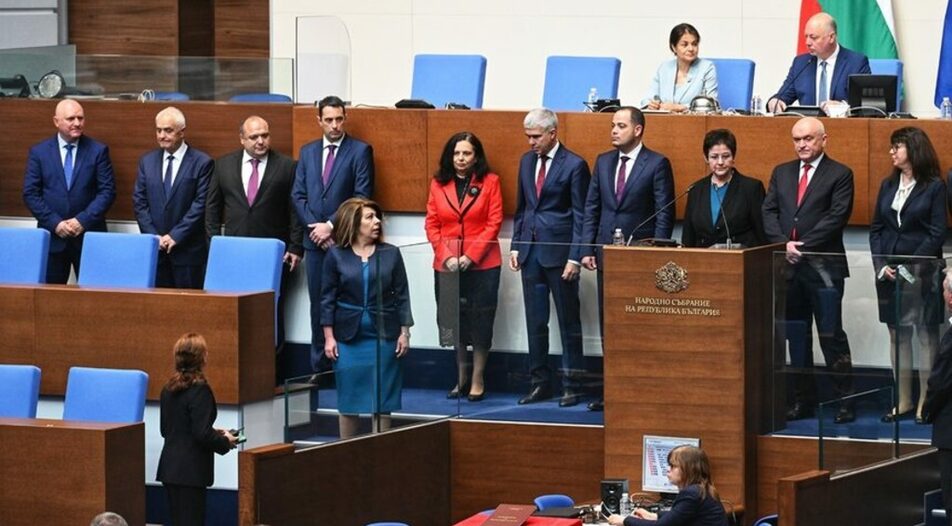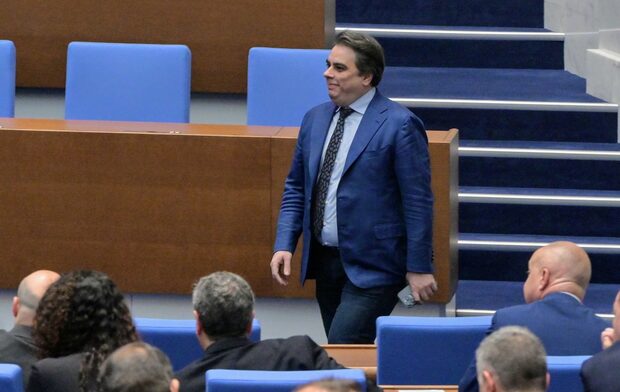Bulgaria has a new caretaker government. After the nominee for caretaker Prime Minister, Dimitar Glavchev, presented his proposed cabinet members to President Rumen Radev and party leaders on 5 April, on Tuesday they were officially sworn in. Glavchev and Radev managed to fit within the time constraints of the constitution, which means that the early parliamentary vote will take place on the same day as the European Parliament elections - on Sunday, 9 June.
When presenting his chosen ministers, Glavchev said that he had tried to include "experts who would provide continuity and a politically balanced government.". A quick look at the names and biographies of the future ministers, however, belies this.
The list is a mix of GERB executives who have proven their loyalty to MRF's Delyan Peevski over the years, people who have held various positions in the executive branch during the mandates of Boyko Borissov and the previous caretaker cabinets, people whose biographies are associated with BSP at the time the party was also close to the MRF, and a few who were considered close to WCC-DB and held ministerial positions in the rotating government.
The choice of ministers for three key institutions - the Internal, the Justice and the Energy departments - underlines the caretaker cabinet's planned bid to reinstate GERB-MRF's dominance over institutions.
Keeping the controversial Kalin Stoyanov as head of the interior ministry, which is key for the organization of the elections, shows that the police will remain within the sphere of influence of Borissov and Peevski. The Justice Ministry, for its part, will be headed by the deputy Prosecutor General Maria Pavlova, which practically means it will be under the command of the unreformed Prosecutor General. This effectively banishes all the efforts made so far to disempower this institution. Lastly, the choice of ex-Bulgartransgaz executive Vladimir Malinov as head of the energy ministry hints that the investigation into the TurkStream roadmap story will be buried.
Who is who in the new cabinet: the elusive Kalin Stoyanov
Interior Minister Kalin Stoyanov turned out to be the formal reason for the failure of the rotation, which led to early elections. At the beginning of the Denkov-Gabriel cabinet, he was presented as an independent expert who had made a career leap under caretaker Internal Minister Boyko Rashkov (who later joined WCC). Subsequently, many question marks emerged around Stoyanov's figure and actions, and after the violent suppression of the football riots in November last year, WCC-DB asked for his resignation, but GERB and MRF saved him. Since then, WCC's Kiril Petkov began claiming he has been the only rotation cabinet member proposed by GERB and an appointment of a Peevski aide allegedly also highlighted Stoyanov's links to MRF.
When the rotation negotiations began, WCC-DB demanded Stoyanov's replacement, but GERB refused and this finally scuppered the deal for a new government. Despite the reformists' call to oust him, the GERB-affiliated nominee for caretaker PM left Stoyanov in the key ministry for the organization of the elections. The decision was announced just a day after the Interior Ministry's Secretary General Zhivko Kotsev - practically the second in command in the ministry - resigned "on personal grounds" (read more on this here). Glavchev justified Stoyanov's staying in the post precisely with Kotsev's departure because the Interior Ministry could not remain without its two heads on the eve of elections.
Mariya Pavlova: the Sarafov protegee
The appointment of the deputy Prosecutor General as justice minister does not augur well for the future of judicial reform, especially the part dedicated to limiting the unchecked powers of the head of the institution. Pavlova has already served once as caretaker minister of justice in the caretaker cabinet of Ognyan Gerdzhikov (2017) and has been deputy minister of justice in two other Radev caretaker governments (in 2021 and 2022). Before she had begun her career as prosecutor, she had worked for over 10 years as an investigator in the National Investigation Service, where she enjoyed the protection of current Prosecutor General Borislav Sarafov.
After he took over the post from Ivan Geshev, Sarafov appointed Pavlova as his sole deputy and, since then, she has demonstrated complete solidarity with her superior, who has been involved in several cases of informal influence peddling in the judiciary (the "Notary" and the Petyo "the Euro" cases). It is disturbing, to say the least, that a high-ranking prosecutor and a protege of a controversial Prosecutor General would head the justice ministry just when the new Judiciary Act, which is supposed to limit the power of the prosecution, is to be finalized by the institution.
Vladimir Malinov: the TurkStream guy
The next important - and controversial - appointment is that of Vladimir Malinov. He has been a long-standing executive director of state-owned gas operator Bulgartransgaz, which built the largest gas infrastructure projects. He was the main actor in the construction of the TurkStream pipeline, which cost 3 billion levs in taxpayer funds and solely catered to Russian geopolitical energy interests.
Malinov was appointed during the early GERB cabinets, but he seemed to be indispensable even during the Petkov and Rumen Radev cabinets. According to Capital's sources, it can be concluded that Malinov is the "engineer" of the PR strategy behind TurkStream to Brussels, presenting it as Balkan Stream and Balkan Gas Hub - the thesis maintained by Boyko Borissov because of the recent leaked documents on the financing and Russian influence on the pipeline. His metadata is available on the long kept secret roadmap for the construction of TurkStream.
Malinov played an important role in the deal with Turkish gas operator Botash, which is now in place but not being used and costing Bulgarian Bulgargas millions. According to opinions from the energy sector, his appointment as caretaker minister is very surprising and probably provoked by the huge pressure on Bulgartransgaz and GERB over the revelations about TurkStream and the laundering of Russian millions through the Arab company Arcad. It is for this reason that it is believed that through his appointment, Malinov can be removed from the operational management of the Bulgarian energy sector in order to relieve the tension and the noise about the Russian influence in the sector.
The rest: unknowns for Foreign and Finance Ministers, continuity in Defense
Lastly, several of the other ministries that are important for the key national priorities - Schengen and eurozone applications, as well as rearmament - go to relative unknowns, which might be a problem - especially when it comes to the first two objectives. Lyudmila Petkova, who will head the Finance Ministry is a little-known head of the Tax Policy Directorate of the institution and has never really been a public figure - something that raises questions about her ability to actively lobby in Brussels and Frankfurt, which is crucial to joining the Euro.
Bulgaria's ambassador to Montenegro Stefan Dimitrov will be the new head of the Foreign Ministry. He was the only last-minute change to the initial list of nominees, presented by Glavchev, which initially named Ivaylo Tsenov, Sofia's consul in Vienna, as the future Foreign Minister, despite his lack of an actual diplomatic experience. According to Glavchev, he has been selected because of the "very good relations he has with the Austrian government," which was supposed to help with the Schengen application, but seemed like a very questionable presumption. Dimitrov, for his part, has a much more solid diplomatic background and has served in high positions both within the MFA and abroad, including in Germany.
As for the Defense Ministry, Todor Tagarev is replaced by his subordinate and ex-General Atanas Zapryanov, who has been described as GERB's gray eminence in the institution and the person who was instrumental for the last-minute reversal of the decision to buy Gripen planes instead of F-16s in 2017-2018. It is unlikely that he would change Tagarev's course.
Bulgaria has a new caretaker government. After the nominee for caretaker Prime Minister, Dimitar Glavchev, presented his proposed cabinet members to President Rumen Radev and party leaders on 5 April, on Tuesday they were officially sworn in. Glavchev and Radev managed to fit within the time constraints of the constitution, which means that the early parliamentary vote will take place on the same day as the European Parliament elections - on Sunday, 9 June.
When presenting his chosen ministers, Glavchev said that he had tried to include "experts who would provide continuity and a politically balanced government.". A quick look at the names and biographies of the future ministers, however, belies this.












